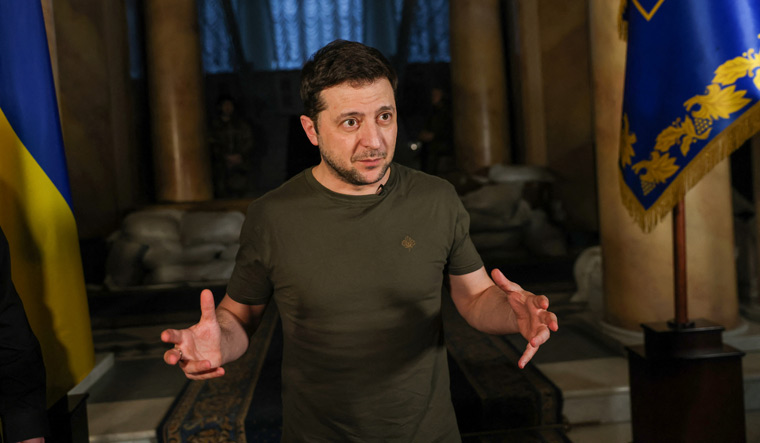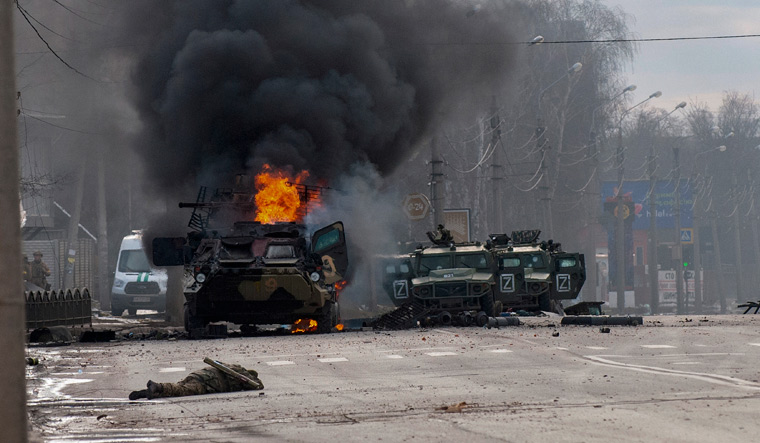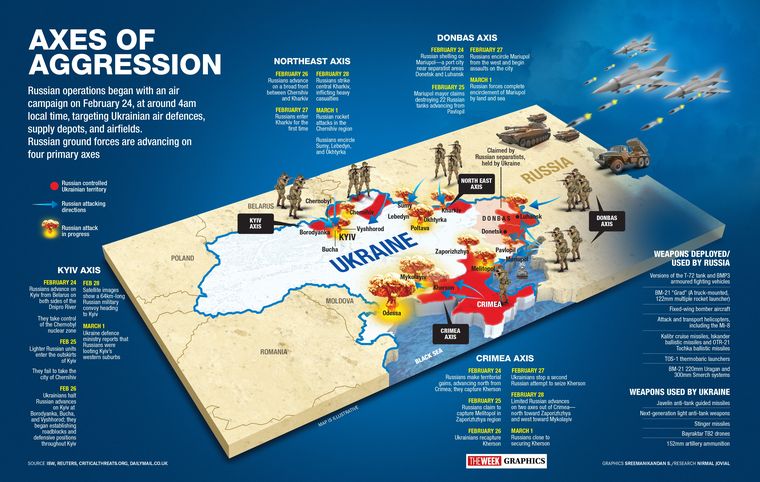Ksenia, a 25-year-old Kyiv resident, has never been a supporter of President Volodymyr Zelenskyy. She voted against him in 2019, but his heroic fightback against the Russian invasion has made her a big supporter of the president. “The first day of the war was scary. Any other person would have run away or surrendered the interests of our country. But Zelenskyy organised a bold resistance. We believe him,” said Ksenia. Zelenskyy’s approval ratings have gone up from a modest 25 per cent to 91 per cent.
The Russian military started its full-scale invasion on February 24. Russian President Vladimir Putin’s aim is no longer limited to resolving the eight-year-old dispute over the Donbas region. He is now trying to neutralise Ukraine’s military power and force the country to abandon its plans to join NATO.
Once the invasion began, life in the capital, Kyiv, and other cities changed dramatically. According to UN estimates, more than six lakh Ukrainians have fled in the first five days of the war. They first moved to the western border, from where they are trying to reach western and central Europe through Poland, Hungary, Slovakia and Romania. Highways from Kyiv—which is located in the north, near the border with Belarus and Russia—to the western city of Lviv are chock-a-block with cars and buses. Civilian flights are grounded; trains are either overloaded or finding it tough to maintain schedules. People are taking up to 36 hours to cover the 600km distance between Kyiv and Lviv by road.
Andrey, who took his wife and two children to Lviv, said he had to spend more than a day on the road. But he said that throughout the trip, his fellow citizens helped him wholeheartedly. “We left in a hurry with two small children, and we were completely unprepared,” said the 48-year-old Kyiv resident. “We stopped twice for food. At first, we got it at half the regular price; the second time, we got it for free. Our people are wonderful.”
When the Russian attacks started, Ukrainian authorities and citizens were in a state of shock, but they soon swung into action. Doctors, firefighters, military personnel and municipal workers have all been working together since then. However, as the war continues, Ukrainians face manifold challenges.
The delivery of food and medicine has been interrupted, especially in the central and eastern parts of the country. And prices are going up. In Kyiv and many other cities, there are long queues outside supermarkets and pharmacies, which are running short of essential supplies. Many stores accept only cash.
The authorities have asked traders not to hike prices and to accept bank cards. However, this directive is not always obeyed. Buyers who cannot pay in cash are being turned away at checkout counters.
Across Ukraine, air-raid warnings are sounded several times a day, forcing residents to hide in basements and parking lots. Initially, the response was fast, but now, fewer and fewer people are moving to shelters.
Also read
- Who is Denis ‘WhiteRex’ Kapustin? Commander of the Russian Volunteer Corps killed in combat
- Ukraine's special services suspected in car bomb killing of Russian general in Moscow
- The ‘mouse’ that roared continues to be heard: Finland and the Russia-Ukraine war
- The digital kill-chain: Russia's mastery of a critical skill in modern warfare
- Russian cargo plane blacklisted by US lands in South Africa; could it strain Pretoria-Washington relations?
- Trump calls India, China 'primary funders' of Ukraine conflict, demands NATO countries to halt Russian energy purchases
Mobile communication and internet facilities are still operational in most cities. Public utilities, too, are largely unaffected. However, water and heating remain a major concern in many cities, especially in the Donbas region. Weather has remained comfortable so far, with temperatures ranging between one degree and nine degrees Celsius, which are higher than normal for this time of the year.
Public transport systems in Kyiv worked normally during the initial days of the invasion. But metro services have been suspended since February 27 in Kyiv and Kharkiv as stations have been converted into bomb shelters.
Shortage of fuel is another major concern. On the first day of the war itself, queues stretched for kilometres outside fuel stations and it has now become almost impossible to purchase gasoline. The authorities have been trying to remedy the situation by means of state regulation, but it does not seem to be working well.
In order to avoid risks, most citizens prefer not to drive around in the cities, and use taxis as much as possible. There have been rumours of massive car thefts, but the police clarified that there were only very few real cases of banditry and fraud. Some citizens are afraid to remain in large cities and are renting village houses and hotels located far away from highways, airports and military facilities.
As the situation turns grim, most of Ukraine’s western allies have expressed their solidarity by imposing stringent sanctions against Russia and by providing weapons. Ukraine’s key allies in its fight against Russia are the United States, the UK and Canada. Influential European powers like France and Germany, too, have unambiguously supported the Ukrainian position, after some initial hesitation. They have announced sanctions against Russia and have offered to send weapons and other equipment.
Interestingly, Ukraine has been winning the information war against Russia and there is a growing sense of unity within the country. Before the escalation of the conflict, Ukrainians had a lot of complaints. Citizens were angry at the government for the constant increase in tariffs for water, electricity, heating, medicines and food. They were also unhappy about the controversial medical reform and the frequent corruption scandals involving politicians and bureaucrats. But everything has changed after the Russian aggression.
Public opinion in Ukraine is still in favour of negotiations with Russia, but without any ultimatums from Putin. The first round of negotiations took place on February 28. While it did not result in any major breakthrough, more talks are expected to happen soon.
“I would very much like the politicians of Ukraine and Russia to agree on peace as soon as possible,” said Alexander, who escaped from the war-torn east. “Ukraine and Russia are neighbours. Fighting a war in the 21st century is idiotic. I hope the two leaders will finally agree on something.”





